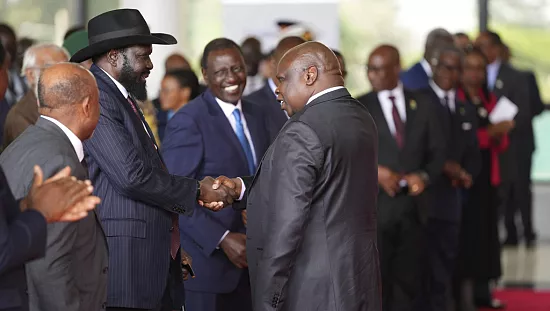
This is Bidibidi refugee settlement in West Nile, Uganda, where thousands of South Sudanese refugees have made a home.
Since their government last month announced plans to begin voter registration in June, many are now yearning to go back home and vote in December.
If in luck, 18-year-old Noel Amba will be a first-time voter. He arrived at the camp a child in 2016 in the heat of civil war.
“If I don’t go and vote for the president that I want it is leading us back. Remember in Uganda, as refugees we don’t get the support that we need 100 per cent. That is why I find it important to go back home and vote. If the right leader comes, all the services will be rendered equally” says Noel Amba a South Sudanese.
Africanews correspondent Raziah Athman reports there are over 198,000 South Sudanese refugees in this settlement. “Since 2016, when Bidibidi was established, many of the refugees have grown into adults who can vote but the asylum law prohibits them from participating in both local and national politics in both countries” Athman said.
The government of South Sudan, Uganda and UNHCR carried out democracy education in the settlement last year but it wasn’t necessarily to prepare refugees for participation in politics.
Nabugere Joel, BidiBidi refugee settlement commandant said there have nbeen some understanding and conditions for the refugees.
“Yes, legally if someone avails himself to the protection of his country of origin then they are no longer qualified to be a refugee unless assessed otherwise. Now, for the South Sudanese case because of general war someone can go back for different reasons. Some go for burial, some go to see family, but there is still war there so we have not been really strict so when they come back and they avail, we reassess and readmit”.
A fight between President Salva Kiir and vice president Riek Machar plunged the country into a civil war in which around 400,000 people were killed and millions displaced, from 2013 to 2018.
The UN is skeptical over South Sudan’s capability of organizing credible elections. It demands that the country fulfills prerequisites including drafting a constitution and unification of rival forces.
Even as the situation is not stable back home, the refugees in Uganda are optimistic their vote would make a difference.
“As you know, whether you go to the South, North, East or West, your heart still belongs and looks back to your motherland. I’m looking forward to go back home for December elections in South Sudan… (but do you know what will happen afterwards?) …well I don’t know what lies ahead but I hope nothing bad will happen” Alfred Waran, one of the refugees said.
South Sudan’s government has released $14 million to election institutions.
According to the head of the National Elections Commission, Abenego Akok, a draft timetable has been drawn for the first presidential election in the world’s youngest country.




